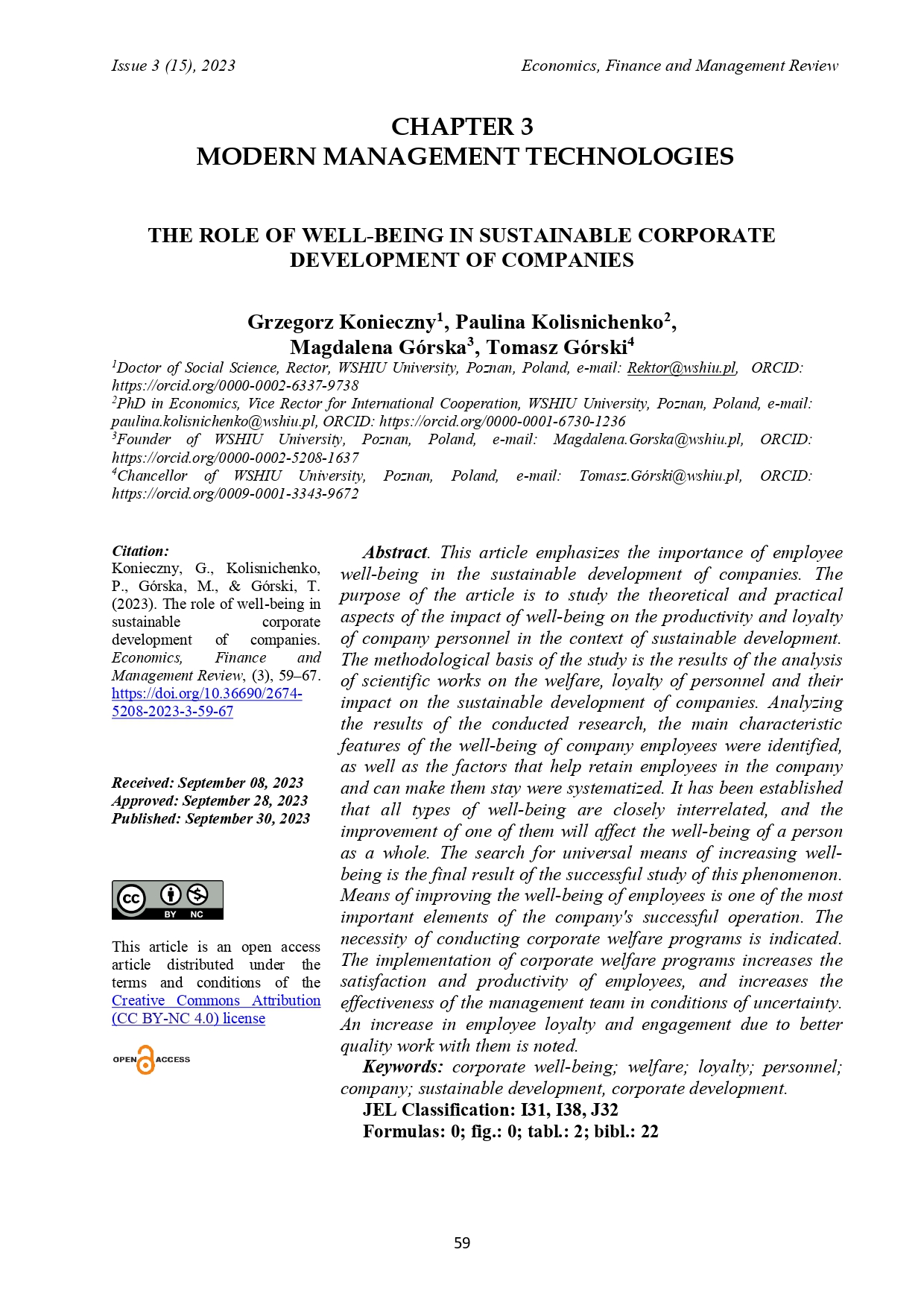THE ROLE OF WELL-BEING IN SUSTAINABLE CORPORATE DEVELOPMENT OF COMPANIES
DOI:
https://doi.org/10.36690/2674-5208-2023-3-59-67Keywords:
corporate well-being, welfare, loyalty, personnel, company, sustainable development, corporate developmentAbstract
This article emphasizes the importance of employee well-being in the sustainable development of companies. The purpose of the article is to study the theoretical and practical aspects of the impact of well-being on the productivity and loyalty of company personnel in the context of sustainable development. The methodological basis of the study is the results of the analysis of scientific works on the welfare, loyalty of personnel and their impact on the sustainable development of companies. Analyzing the results of the conducted research, the main characteristic features of the well-being of company employees were identified, as well as the factors that help retain employees in the company and can make them stay were systematized. It has been established that all types of well-being are closely interrelated, and the improvement of one of them will affect the well-being of a person as a whole. The search for universal means of increasing well-being is the final result of the successful study of this phenomenon. Means of improving the well-being of employees is one of the most important elements of the company's successful operation. The necessity of conducting corporate welfare programs is indicated. The implementation of corporate welfare programs increases the satisfaction and productivity of employees, and increases the effectiveness of the management team in conditions of uncertainty. An increase in employee loyalty and engagement due to better quality work with them is noted.
Downloads
References
Diener E., (1984) „Subjective well-being”. Psychological Bulletin 95 (3)
Kim, Y., Park, J.E., Wier, B. (2012) "IsFirm-Specific CSR Sustainable? A Longitudinal Analysis." Journal of Business Ethics, 110 (3)
McWilliams A., Siegel D. (2001) „Corporate Social Responsibility: A Theory of the Firm Perspective." Academy of Management Review, 26 (1)
Beaumont Jen Measuring National Well-being – Older people and loneliness. The Office for National Statistics. Electronic data. Newport, 2013. URL: http://www.ons.gov.uk/ons/dcp171766_304939.pdf
Burlakova, I., Sheviakov, O., Kondes, T. (2021). Coaching as a tool for the formation of corporate well-being Scientific Center of Innovative Researches. P.306. URL: https://conf.scnchub.com/index.php/ICEAF-2021/paper/viev/
Burlakova, I., Sheviakov, O., Kondes, T. (2020). Сognitive approach to corporate well-being management International conference on economics, accounting and finance academy of economics and pedagogy July 2, 2020 – July 4, 2020 at the Prague, Czech Republic, 2020. P. 29 – 30.
Burlakova, I., Sheviakov, O., Kondes, T. (2020). Features of corporate well-being.-Corporate management: from creation to success: monograph. Tallinn. Scientific Center of Innovative Researches OÜ. 2020. 352 р. P. 142 – 154. DOI: https://doi.org/10.36690/CMCS-142.
Capnary, M.C., Rachmawati, R., Agung, I. (2018). The influence of flexibility of work to loyalty and employee satisfaction mediated by work life balance to employees with millennial generation background in Indonesia startup companies. Business: Theory and Practice, 19, 217-227.
Culbertson, S. (2010). Feeling good and doing great: The relationship between psychological capital and well-being. Journal of Occupational Health Psychology. Vol.15. № 4, pp. 421 – 433.
Enhancing well-being at work: The role of emotion regulation skills as personal resources / G. Buruck, D. Dorfel, J. Kugler, S. Brom // Journal of Occupational Health Psychology. – 2016. – Vol. 21 (4). – P. 480-493.
Gorgenyi-Hegyes E, Nathan RJ, Fekete-Farkas M. Workplace Health Promotion, Employee Wellbeing and Loyalty during Covid-19 Pandemic—Large Scale Empirical Evidence from Hungary. Economies. 2021; 9(2):55. https://doi.org/10.3390/economies9020055
Harter, J.K., Schmidt, F.L. and Keyes, C.L. (2003) Well-Being in the Workplace and Its Relationship to Business Outcomes: A Review of the Gallup Studies. In: Keyes, C.L.M. and Haidt, J., Eds., Flourishing: Positive Psychology and the Life Well-Lived, American Psychological Association, Washington DC, 205-224. http://dx.doi.org/10.1037/10594-009
Mazur-Wierzbicka E. Determinants of Employee Loyalty from the Perspective of Employees of Socially Responsible Organizations European Research Studies Journal Volume XXIV, Issue 4B, 202 pp. 713-722.
Mihus, I., Laptev, S., Parashchenko, L., Koval, Y., Odarchyk, K., & Panchenko, O. (2021). The impact of the COVID-19 pandemic on the loyalty of employees. Ad Alta-Journal of Interdisciplinary Research, 38-41. URL: http://www.magnanimitas.cz/ADALTA/110117/papers/A_07.pdf.
Mininni, G., Manuti, A., Scardigno, R., & Rubino, R. (2010). Subjective wellbeing between organizational bonds and cultural contaminations. World Futures: The Journal of Global Education. 66(6), 387–397.
Moen, P., E. L. Kelly, W. Fan, S.-R. Lee, D. Almeida, E. E. Kossek, and O. Buxto, Does a Flexibility/Support Organizational Initiative Improve High-Tech Employees’ Wellbeing? Evidence from the Work, Family, and Health Network, American Sociological Review, 81(1), 134-164, 2016.
Mohr, L.A., Webb, D.J., Harris, K.E. (2001). ,,Do Consumers Expect Companies to be Socially Responsible? The Impact of Corporate Social Responsibility on Buying Behavior." Journal of Consumer Affairs, 35(1).
Orlitzky M., Schmidt F.L., Rynes S.L. (2003) „Corporate Social and Financial Performance: A Meta-Analysis." Organization Studies, 24(3).
Porter, M.E., Kramer, M.R. (2006) „Strategy & Society: The Link Between Competitive Advantage and Corporate Social Responsibility." Harvard Business Review, 84(12).
Ryan RM, DeciEL (2001) “On happiness and human potentials: A review of research on hedonic and eudajmonic research”. Annual Review of Psychology.
Sen A. (2015) ,,Nierówności. Dalsze rozważania”, Wydawnictwo Znak; Fundacja im. Stefana Batorego, Kraków
Konieczny, G.; Kolisnichenko, P.; Gorska, M.; GorskI, T. (2023). Corporate well-being as the energy of business. International Conference on Corporation Management. DOI: https://doi.org/10.36690/ICCM-2023-78-81

Downloads
Published
How to Cite
Issue
Section
License

This work is licensed under a Creative Commons Attribution-NonCommercial 4.0 International License.








